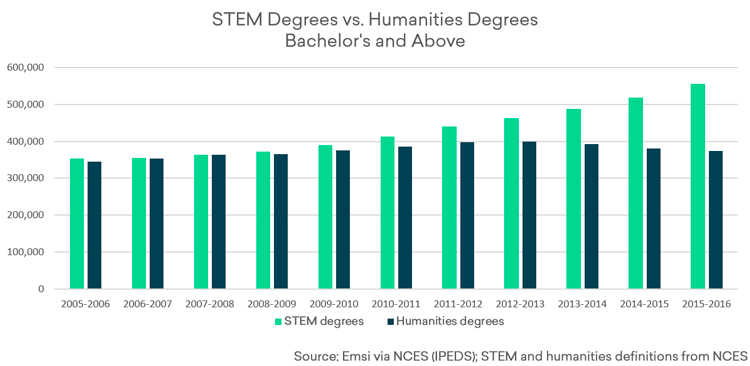Having recently finished my second year of college and already starting to prepare for my third, I can’t help but reminisce about the things I’ve learned since my very first day. Throughout the past two years, I’ve become more organized, I’ve made better friendships, and I’ve learned many things from my professors. On the other hand, I’ve also realized that the old stereotypes about college majors are still present, even today.
It’s no secret that STEM (science, technology, engineering, math) degrees have always been looked at more highly, especially in the year 2018, when there are more technological advances every day. Unfortunately, this has also meant that the humanities, and careers associated with these degrees, have been quietly neglected throughout the years.

Comparison STEM and Humanities Degrees | Economic modeling
The stereotypes have always been the same – that STEM degrees are more challenging and for students who are are less inclined to be social, and that the humanities are much less challenging and for people who like people. Although true in some cases, many people pursuing a degree in STEM are also heavily involved in campus organizations, and contrary to popular belief, many humanities degrees are incredibly challenging.
It’s true that in a span of just five years (from 2010 to 2015) the amount of STEM majors boomed from 16% to 43%, and that humanities majors declined -0.4% (Econ. Modeling). But Valerie Strauss from The Washington Post defends the latter. She says that the “point” of a humanities education is that one is “exposed to various ways of thinking, analyzing, and questioning,” and that many employers are looking for those traits today.
Strauss believes that “through studying the humanities, one has the opportunity to get to know oneself and others better, the opportunity to become better able to understand and grapple with complex moral issues, the complexities and intricacies of humanity” (WashPost). I couldn’t have said it better myself.
The point is that everyone is different, we all have our unique strengths and weaknesses, and there will always be someone out there that needs you on their team, whether you have a degree in STEM or the humanities.
Sources
Strauss, Valerie. The Washington Post. https://www.washingtonpost.com/news/answer-sheet/wp/2017/10/18/why-we-still-need-to-study-the-humanities-in-a-stem-world/?noredirect=on&utm_term=.ed044e102bb9
Wright, Joshua. Economic Modeling. http://www.economicmodeling.com/2017/09/01/stem-majors-accelerating-every-state-just-humanities-degrees-declining/

